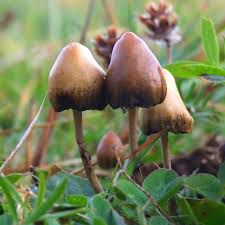On January 28, 2020, the Santa Cruz City Council approved a resolution to demote the investigation and arrest of individuals twenty-one (21) years of age and older involved with the adult personal use, possession, and cultivation of entheogenic psychoactive plants and fungi listed on the Federal Schedule 1 to be amongst the lowest priorities for the City of Santa Cruz. The decision was made after two previous Council meetings on November 10th and December 2nd. This past week’s meeting began with half an hour of public comment, followed by a council discussion, and concluded with a unanimous passing of the resolution, with a few amendments.
Dr. Allison Feduccia, a neuropharmacologist and Senior Clinical Data Scientist at the Multidisciplinary Association for Psychedelic Studies (MAPS), kicked off the public comment section of the meeting. As her career would indicate, she was quite knowledgeable and easily summarized current medical thought on psychedelics. “I’ve been studying psychedelics since 2004… These substances are not addictive. We have a lot of research not only from the current clinical trials that are happening across many universities in the United States, but also from historic use. People have been using psychoactive plants and fungi for thousands of years.” At the end of her speech, Feduccia focused on the current state of entheogenic drugs in Santa Cruz, “We have an opportunity in the community for people to be seeking out these experiences and using them to help promote their own health and wellbeing and help them overcome their PTSD and substance abuse disorders… We don’t even know the full potential yet, but what we do know is that the safety profile is good when taken with consideration.”
After Feduccia’s informative statement, two representatives, Sean Cutler and Julian Hodge, from Decriminalize Santa Cruz and leaders of Students for Sensible Drug Policy at UCSC advocated for the new resolution. However, they both insisted that cultivation also be lowered to Federal Schedule 1 as well, as it was unacknowledged in the resolution at the beginning of the meeting. Cutler passionately reasoned that cultivation should be allowed “for reasons of respecting indigenous practices.” Hodge followed up Cutler’s more specific critique of the resolution by encouraging the City Council’s efforts, “I’ve met so many amazing people with amazing stories about how entheogenic plants and fungi have saved their lives. As organizations like MAPS work to create access to those who need it, we look to our City Council in the meantime to help us.”
Perhaps the most emotionally evocative moment of the meeting occurred when a veteran shared his experience with entheogenic drugs. He began describing his two tours in Afghanistan, “I was in roughly 180 firefights, 3 explosions, lost friends, saw innocent Afghani civilians dead.” He then spoke of coming home and the inadequacies he faced with his prescribed drugs, naming Percocet, and “seeking opiates on [his] own.” He struggled through physical therapy, counseling, weekly hospitalizations, until he found psychedelics, which “made it easier to let go of the baggage [he] was holding onto.”
After the public commentary period, Councilman Glover motioned to “adopt the resolution… with the reincorporation of the word cultivation.” He also asked for another report and “safe use and prevention education strategy in collaboration with local organizations” at the earliest convenience. After a long discussion, the resolution passed unanimously. While the resolution only affects the City of Santa Cruz, perhaps this resolution will soon be approved throughout the county as well.













